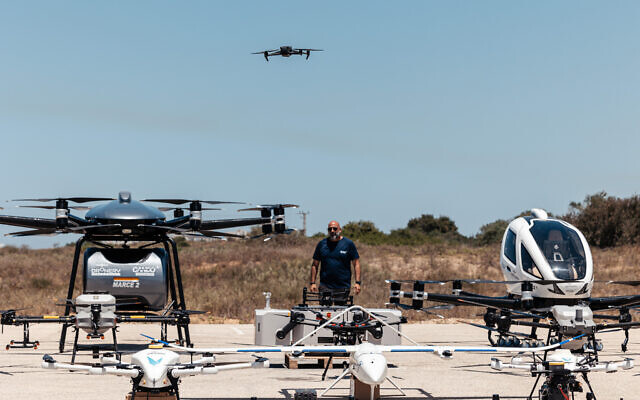Israel has launched test flights of autonomous aircraft that can carry passengers and heavy cargo as the country prepares its national airspace for air taxi transport and a number of drone delivery services.
The first air taxi test flights conducted in recent days are part of a NIS 60 million two-year government-led pilot project called Israel National Drone Initiative (INDI), which was originally established in 2019 to create a national drone network and partner with regulators and private companies to prepare the skies for drone delivery across Israel.
The overall objective of the project is to transport passengers and heavy cargo from one place to another and improve traffic congestion on Israel’s busy roads using drones, as well as provide commercial and public services more efficiently.
“This is the first initiative of its kind in the world for a comprehensive and multidisciplinary examination of new technologies, including the transport of cargo and subsequently people,” said Transport Minister Miri Regev. “The collaborative project examines all aspects – including regulation and legislative changes – involved in the commercial operation of drones as an additional tool for dealing with congestion.”
The initiative is a partnership between government entities led by the Ministry of Transport, the Israel Innovation Authority, Aylon Highways Ltd., and the Civil Aviation Authority of Israel (CAAI).
As part of the second phase of the INDI project launched earlier this year, 11 drone operation and delivery companies were involved in test and experimental flights across Israel last week. For the first time, test flights of an autonomous flying vehicle, an Electric Vertical Takeoff and Landing (EVTOL) aircraft with long-range capabilities were conducted to carry heavy cargo loads in a managed urban airspace, which could help people in the future. could transport.

Over the next two years, Israeli drone operating companies will conduct test flights across the country for one week every month. (by Creative & Productions)
The Pardes Hanna-based startup called AIR flew its AIR ONE all-electric two-seater eVTOL, which can carry a total payload of up to 220 kg (485 lb) for a range of up to 160 km (99.4 mi) Is. It has collapsible wings for easy parking and can take off or land from any flat surface and is suitable as an everyday alternative to short distance travel in the sky.
Dronery, a subsidiary of Israeli drone delivery fleet operator Kando Drones, conducted for the first time demo flights of China’s Ehang two-seater air taxi drone, which is being developed by Israeli air operators to carry passengers. The fully autonomous EH216-S aircraft can haul up to 220 kilograms in total within a range of 30 kilometers (about 18 miles) using its intelligent command-and-control system.
Other Israeli companies involved in the INDI project are Airwayz Drones, which provides AI-based systems for smart management of drone fleets; Highlander Aviation, developer of an autonomous air traffic control system; and Roboticon, developer of mobile autonomous robotic systems based on land and in the air.
Dror Bin, CEO of the Israel Innovation Authority, said, “The importance of these demonstrations lies in creating a regulatory sandbox that allows all relevant stakeholders to gain practical experience before establishing a regulatory infrastructure that enables a comprehensive economically viable model.” allows.” “The ability of Israeli startup companies in the drone industry to experiment within this sandbox gives them a competitive advantage in the global market.”
The INDI initiative is also working on the development of a “system of air routes in the sky” to safely deploy and monitor hundreds of drones operating as manned aircraft in the same airspace. The system will allow different types of drones to fly together for different purposes including health, commerce, safety, security and future passenger transport. As part of this effort, the INDI project works closely with additional entities, including the Israeli Air Force, the Israel Airports Authority Ltd., and local municipalities.
Israeli airspace is one of the most tightly controlled and busiest relative to the country’s size. It has a lot of incoming and outgoing aircraft as well as a heavy military air presence with planes and helicopters in both training and active duty.
Over the next two years, drone operating companies participating in the INDI initiative will continue to operate flights across the country for one week each month. The flights will take place in a controlled airspace, covering long distances of up to 150 kilometers across Israel, transporting heavy payloads, and in the future, drones that will be able to transport people from one place to another. The Aylon Highway will serve as a pilot site for conducting flight demonstrations.
“The aircraft now being tested will be able to bypass traffic jams, and reduce congestion by removing cars and trucks from roads in conjunction with air traffic management systems,” said Orly Stern, CEO of Aylon Highways. “This will create a variety of air transportation options for routine and emergency cargo transfers.”
